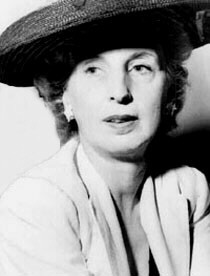Kay Boyle
 |
|
| Born |
February 18, 1902 St. Paul, Minnesota, U.S. |
| Died | December 27, 1992 (aged 90) Mill Valley, California, U.S. |
| Nationality | American |
| Spouse | Richard Brault, Ernest Walsh, Laurence Vail, Baron Joseph von Franckenstein |
| Children | Six |
Kay Boyle (February 19, 1902 – December 27, 1992) was an American novelist, short story writer, educator, and political activist.
The granddaughter of a publisher, Boyle was born in St. Paul, Minnesota, and grew up in several cities but principally in Cincinnati, Ohio. Her father, Howard Peterson Boyle, was a lawyer, but her greatest influence came from her mother, Katherine Evans, a literary and social activist who believed that the wealthy had an obligation to help the less well off. In later years Kay Boyle championed integration and civil rights. She advocated banning nuclear weapons, and American withdrawal from the Vietnam War.
Boyle was educated at the exclusive Shipley School in Bryn Mawr, Pennsylvania, then studied architecture at the Ohio Mechanics Institute in Cincinnati. Interested in the arts, she studied violin at the Cincinnati Conservatory of Music before settling in New York City in 1922 where she found work as a writer/editor with a small magazine.
That same year, she met and married a French exchange student, Richard Brault, and they moved to France in 1923. This resulted in her staying in Europe for the better part of the next twenty years. Separated from her husband, she formed a relationship with magazine editor Ernest Walsh, with whom she had a daughter (born after Walsh had died of tuberculosis).
In 1928 she met Laurence Vail, who was then married to Peggy Guggenheim. Boyle and Vail lived together between 1929 until 1932 when, following their divorces, they married. With Vail, she had three more children. During her years in France, Boyle was associated with several innovative literary magazines and made friends with many of the writers and artists living in Paris around Montparnasse. Among her friends were Harry and Caresse Crosby who owned the Black Sun Press and published her first work of fiction, a collection titled Short Stories. They became such good friends that in 1928 Harry Crosby cashed in some stock dividends to help Boyle pay for an abortion. Other friends included Eugene and Maria Jolas. Boyle also wrote for transition, one of the preeminent literary publications of the day. A poet as well as a novelist, her early writings often reflected her lifelong search for true love as well as her interest in the power relationships between men and women. Boyle's short stories won two O. Henry Awards.
...
Wikipedia
